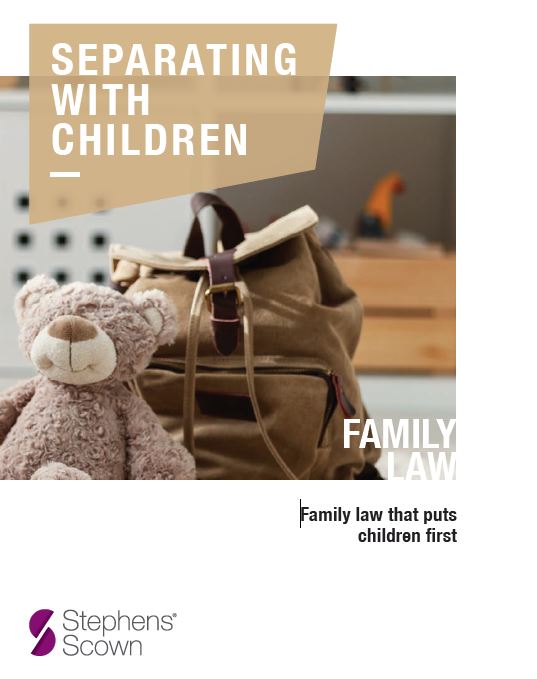Child Custody Solicitors
We know that your children are the most important people in your lives. We appreciate that they are your priority and your focus.
At Stephens Scown we will be with you every step of the way, offering support and guidance to help you navigate any issues concerning your children which may arise following a relationship breakdown.
We can help at every stage of the process, whether that be reaching an agreement or in court proceedings and will help you to find the right solution in your particular case by offering specialised, empathetic, and professional advice which is tailored to your unique case.
We can offer assistance in the following areas:
- Orders for children
- Social services and care proceedings
- Relocation
- Child abduction
- Special Guardianship Orders
- Out of Court settlements
- Grand-parent and step-parent issues
- Fertility law
At the forefront of our minds is how you can manage any issue as swiftly and cost effectively as possible. We will discuss with you the various ways of reaching agreement outside of the court process so that you can negotiate a way forward with the other parent.
We’re able to offer the first 30 minutes of advice free in the majority of cases and will discuss this before your first appointment with us. Get in touch today on 0345 450 5558 or enquiries@stephens-scown.co.uk
Dealing with child custody issues
If court proceedings become necessary, a child arrangements order can be sought from the court. This was previously referred to as ‘child custody’ or ‘child access’. It has also been referred to as ‘residence’ and ‘contact’. The terminology that the court now uses is Child Arrangements Orders, which can set out where the child lives – ‘live with orders’, and the time they spend with the other parent – ‘spend time with’ orders.
‘Sole custody’ or ‘joint custody orders’ as were previously in place, can still be made by the court by granting a ‘live with’ order to one parent or in some cases by making a ‘live with’ order for both parents so that the child lives with both of their parents for the time set out in the order.
We understand that this terminology is confusing. Our team of specialist child lawyers will demystify this confusing terminology and guide you through the process to ensure that you understand it.
Child custody mediation and negotiation
In some cases, court proceedings may be the only option. We can help to obtain orders through the court urgently, if needed.
We adopt a holistic view and will look at a range of options when finding the right solution in your case – one which will work for you and for your child.
We will support you to find an amicable solution which works for your child, through communication, negotiation, mediation, or a more collaborative approach.
If an out of court agreement is not able to be reached, we can work with you to navigate the court process to ensure the best outcome for you and, most importantly, your child.
Social services and care proceedings
If the Local Authority feels that children are at risk of significant harm, it may seek to place them in its care, or with other family members.
If you find yourself in this situation, you need advice at the earliest opportunity. As soon as you are told by the Local Authority that you have a formal meeting with them (often called a PLO meeting or Public Law Outline meeting) or that it is going to start court proceedings (seek a Care or Supervision Order), you should obtain advice. It is better to seek advice early and understand all options available to you.
These situations can be emotionally challenging and legally complicated. We understand that you may be worried, but our dedicated team of Children Law specialists are on hand to explain things clearly and apply wide-ranging expertise to assist you in every way.
Our team is sympathetic, friendly, and approachable, with extensive experience representing family members grappling with issues relating to children in care, including mothers, fathers, adult siblings and grandparents.
We can represent you in these complex proceedings and legal aid is available to you if you are a parent, meaning that you do not need to worry about legal costs.
We also have significant experience representing children in relation to instructions from their court-appointed guardian.
Resolving further family issues
We can help not only parents but also grandparents, special guardians, guardians, step-parents and step-grandparents, providing advice in their particular case.
We also have a highly specialist team who can help with international issues including preventing a child moving to another country for the purpose of a holiday or to live, abduction cases, international adoption issues and embryo donor transfers which take place abroad.
Our specialist team can also advise on relocation issues within England and Wales for the purpose of a holiday or a permanent move, with issues concerning a choice of school for your child, issues concerning parental responsibility, a change of surname or whether a child should undergo medical treatment.
We can also assist with issues concerning fertility, advising on sKai Whickerurrogacy, egg, sperm and embryo donation.
Who are we?
We are a specialist team offering child-focused, proactive advice. We have extensive experience in children law and several of our team are accredited Resolution Specialists in matters which relate to children and members of the Law Society’s Children Panel.
Our team has been ranked consistently for many years as the best solicitors in the region for children and family law, in both The Legal 500 and Chambers.
Frequently asked questions:
Can I get full custody of my child?
Yes, the court can make an order confirming your child lives with one parent. The court can make an order which it considers is best for the child in your case. The court does have a presumption that having both parents in the child’s life will benefit them unless there is a good reason why one of them should be excluded.
Are there different types of child custody?
Child arrangements orders can be made by the court which set out who the child ‘lives with’ and when they ‘spend time’ with the other parent which was called ‘sole custody’ and ‘joint custody’.
What happens with child custody when parents live in different countries?
Each case is tailored to the child and what is best for them. Where parents live in different countries, it is likely that they will live with one parent and spend time with the other, usually in the school holidays when they are of school age, which can take place in the country in which the child is living or the country in which the absent parent is living. Arrangements will need to be made for the transportation of the child between the countries, including who will fund this.
Who pays court costs in child custody?
Costs orders are not often made by the court in cases concerning children. This means that usually both parties will pay their own costs if court proceedings become necessary.


How can we help you
"*" indicates required fields
By pressing send and providing your details you are agreeing to our Privacy Notice.
Once you submit your enquiry we will forward to the correct legal team to get in touch as soon as possible.
Related Services
- Adoption
- Social Services and Care Proceedings
- Child Abduction
- Orders for Children
- Grandparent Custody
Downloads
Related Info Hubs
Team Leader







